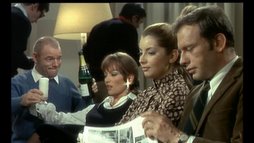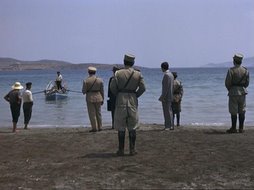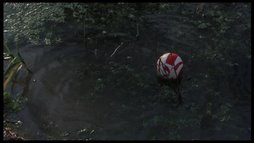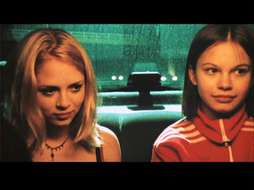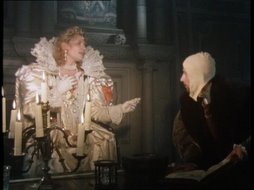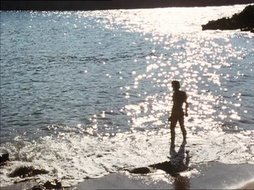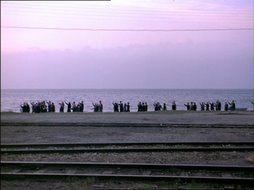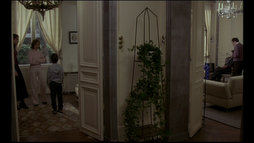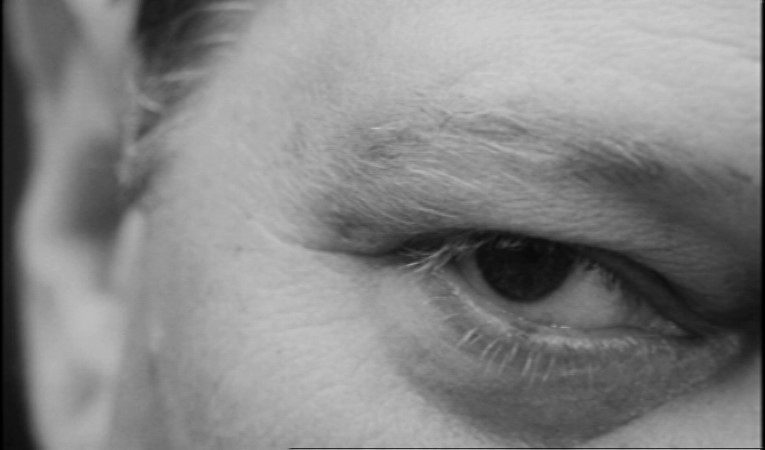
Juraj Herz started his career in filmmaking as a pupeteer and animator, much like his well-loved countryman Jan Svankmajer but whereas Jan spent most of his career in stop-motion animation, Herz chose early to delve into making films with real people. Perhaps a mistake in hindsight, as a lot of his films have now been lost - and the ones that survive are screened rarely, but if he has achived nothing else he has at least produced the unmitigated surreal masterpiece that is The Cremator.
The Cremator of the title (Kopfrkingl played by Rudolf Hrusínský) works, surprisingly enough in a crematorium. Day in ay out he burns dead bodies, returning the flesh to dust and, in his opinion - returning the soul to the ether, cleansing it of the decadence inherent in flesh. Kopfrkingl lives and works in 1930s Czechoslovakia, he has an intelligent if slightly effeminate son and a daughter with a talent for music; his doting wife (played by Vlasta Chramostová) remains quiet yet respectful. Some Nazi-sympathising friends come round for tea, over which they explain the benefits of an Anschluss with the Reich (citing Austria as an example) - and from hereon Kopfrkingl begins his slippery slope. Imperceptibly at first, but with more obviousness as the film progreses Kopfrkingl's mantras and slogans that he repeats to others start to take on distinct political overtones as he becomes closer to the Nazis, embracing their decadence and hedonism - soon he is spying on Jews in the community and informing on his closest friends. I wont spoil the ending, but a perverse collection of scenes culminates in Kopfrkingl finding his ideals realised at the centre of fascist ideology, set against the background of Hieronymus Bosch's epic, The Garden of Earthly Delights.
Kopfrkingl is the film, the film is about him, about his beliefs and misguidances and is shot entirely from his warped point of view. From the film's opening montage of caged predators at the zoo intercut with close-ups of his and his wife's face it is clear this film is anything but normal. Fish-eye lenses are all the rage now in warping a cinematic image, but the way in which Herz uses wide angled lenses to convey a pervers view of the world is both breathtaking and appalling at the same time. Coupled with Hrusínský's incredibly understated performance, ice cold to the last, we get a bizarre juxtaposition of his demented view of life, and the outward normality of his character that everyone around him sees. It would not be overstating just how chilling Kopfrkingl is to say that in many ways, he is a far more daunting prospect than Hannibal Lecter. The warped frame however, is just one aspect of Herz's complete control of the mise-en-scene a control that even at it's most audatious comes across simply as brilliant. One 'trick' he specifically uses to confuse and confound the audience is to cut to a close-up and, with the same music still playing, cuts to a wider shot to suddenly reveal we are in a completely different setting to 2 seconds ago. The repetition of this this technique - taking our beliefs on what we are seeing ad playing with them slightly works incredibly well at disorientating the viewer by the end of the film leaving the audience seriously questioning the reliability of the subjective viewpoint, from whcih the film is given. Futhermore, Kopfrkingl has an interest that becomes a preoccupation with Lhasa - the buddhist city of the Dalai Lama - and this preoccupation becomes obsession before in the final reel we see that he is in fact trying to attain his own form of enlightenment. For most directors merely stating this with actions would be enough but Herz uses a rising wide-angled lens to distort the appearance of the protagonist into buddha-like proportions with a larger head than body, viewed often from above as if in meditation.
Herz could have made the film powerful enough as it is with his visual tricks, with the way images are repeated in startlingly different contexts (one poster is used three times - once for the Crematorium, once for boxing, and once for the Nazis) but something would still be missing. The film sounds as creepy as it looks. The measure of cool calm collectedness in Hrusínský's voice really makes his character something else entirely. Whether he is delivering a eulogy (one of which he turns into a fascist political speech mid-ceremony), informing on friends, or describing the working of the furnaces - it is all said without emotion. In a matter-of-fact style that lacks the relish of Lecter's elocution, but is all the more provocative for it's total dissassociation with the events being described, Hrusínský's domineering voice lingers long after the film has finished. And so does the wonderful music from Zdenek Liska which not only sets the location, but also adds to the disorientating effect of the cinematography through stark juxtaposition and finally, creates that touch of coldness that makes Kopfrkingl seem somehow inhuman. Interestingly enough there are also references to European classical musicians littered through the film - most notably characters called Dvorak, Strauss and Janacek though there are visual metaphors and references too.
Political allegory or surreal drama, it's easy to see why the Quay Brothers (respected surreal filmmakers in their own right) are such big fans of this work. The first 40 minutes does drag slightly, but in the film's finalé almost everything that has gone before - from the big things to the minutae of the characters' daily lives suddenly takes on an until-then unimaginable significance. one should have seen the ending coming, but for me the shock of how predictable yet unseen it was was as powerful as any element of the filmmaking process. Without doubt one of the great productions of the Czech new wave. 9/10














